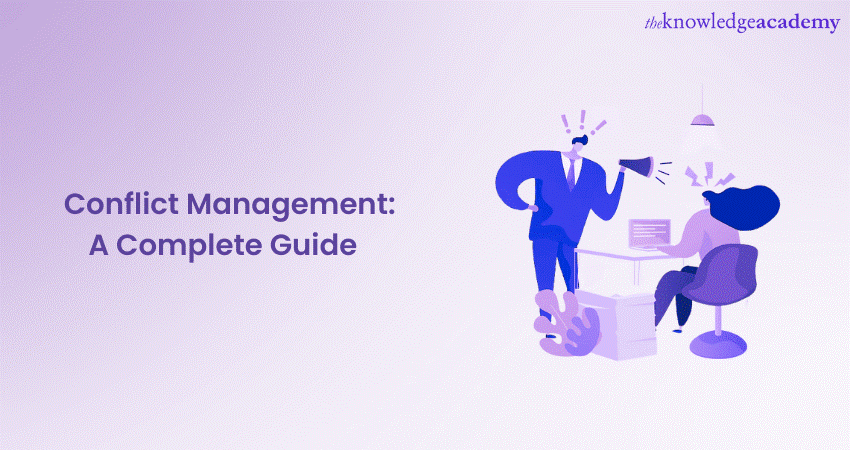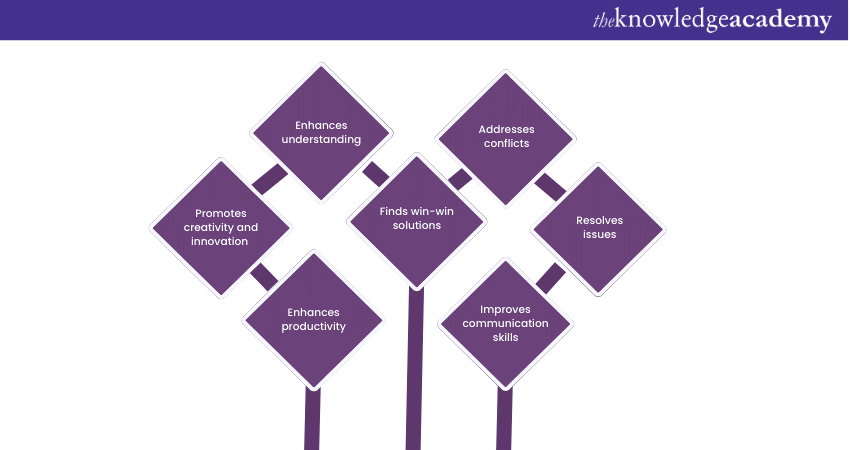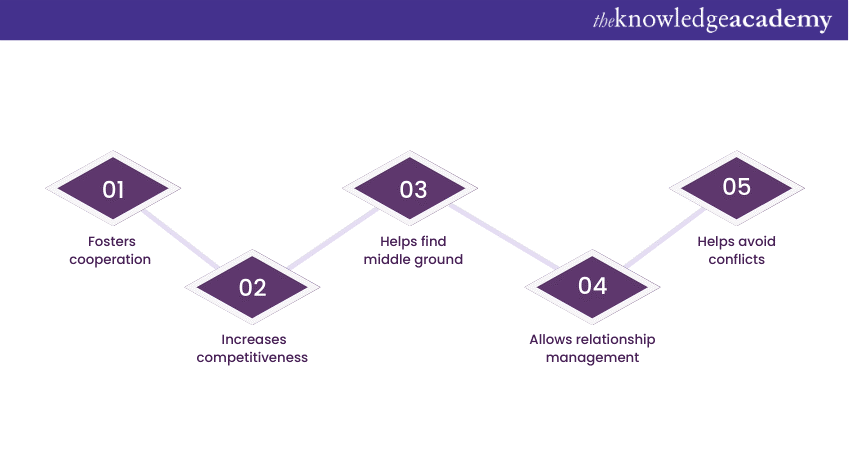We may not have the course you’re looking for. If you enquire or give us a call on 01344203999 and speak to our training experts, we may still be able to help with your training requirements.
Training Outcomes Within Your Budget!
We ensure quality, budget-alignment, and timely delivery by our expert instructors.

Conflict is part of life. It can occur in our personal and professional lives. While conflict can be uncomfortable and sometimes even destructive, it presents an opportunity for growth and resolution. This is why understanding Conflict Management can help you constructively manage conflict.
Conflict Management is a skill that can be learned and improved; want to know? In this blog, you will learn what is Conflict Management, its importance, techniques and skills, along with its benefits. Let's explore further to learn more!
Table of contents
1) What is Conflict Management?
2) The importance of Conflict Management
3) Techniques and approaches for managing Conflicts
4) Benefits of Conflict Management
5) Conflict Management skills
6) Conclusion
What is Conflict Management?
Conflict Management is the method of resolving disagreements in a constructive way. It involves identifying the underlying issues, communicating effectively, and finding fair and equitable solutions for everyone involved.
In Conflict Management, the focus is not to win at the expense of others but to arrive at mutually beneficial outcomes. Collaborative problem-solving and Negotiation are critical skills in this process. It enables individuals to work together to reach agreements that address the needs and interests of all stakeholders.
Moreover, effective management involves several key components. First and foremost, it requires identifying the root causes and underlying issues that led to the conflict in the first place. Therefore, individuals can gain insight into the emotions, values, and interests at play. This deeper understanding also sets the stage for more meaningful and productive communication.

The importance of Conflict Management
The importance of Conflict Management cannot be overstated. Arguments are a natural and inevitable part of human interaction. It arises when individuals or groups have differing opinions, interests, or needs.
Without proper management, these issues can be escalated, leading to damaged relationships, increased stress, and decreased productivity. On the other hand, when conflicts are effectively managed, they can result in positive outcomes and growth. Here are some key reasons why Conflict Management is important:

a) Preserves relationships: Conflict Management helps preserve relationships by addressing conflicts constructively. It allows individuals to express their perspectives while also considering the views of others. By finding common ground and seeking win-win solutions, it prevents conflicts from causing long-term damage to relationships.
b) Promotes understanding: It also fosters understanding between conflicting parties. It encourages open and honest communication, active listening, and empathy. Through effective dialogue, individuals can gain insights into each other's perspectives. They can develop a deeper understanding of the underlying issues. This understanding forms the foundation for resolving conflicts and building stronger relationships.
c) Enhances communication skills: Conflict Management requires effective communication skills. It encourages individuals to express their ideas and feelings clearly and respectfully. Individuals can prevent misunderstandings and improve the overall quality of communication. Effective communication not only resolves conflicts but also strengthens relationships and promotes a positive work or home environment.
d) Facilitates problem-solving: This concept is closely linked to problem-solving. It involves identifying the root causes of conflicts and seeking mutually beneficial solutions. It allows conflicting parties to work together towards resolving issues. This process not only resolves the immediate conflict but also builds problem-solving skills that can be applied in future situations.
e) Boosts productivity: Unresolved conflicts can create tension, disrupt workflow and decrease motivation and engagement. Conflict Management addresses conflicts promptly, minimising their negative effects on productivity.
f) Encourages growth and innovation: When conflicts are properly managed, they become opportunities for learning and improvement. Conflicting ideas and perspectives can spark creativity and lead to innovative solutions.
Learn how to resolve conflict effectively and build stronger relationships with our Conflict Management Training.
Techniques and approaches for managing Conflicts
Conflict Management techniques and approaches are various methods used to address and resolve issues effectively. These approaches aim to find solutions that satisfy the needs and interests of everyone involved. Here are some commonly used Conflict Management Techniques and approaches:
a) Collaborative approach: This approach encourages open communication and active participation from all parties. It focuses on finding win-win solutions by considering the interests and needs of everyone involved.
b) Competitive approach: It involves asserting one's own interests without considering others. It often results in a win-lose situation, where one party gains at the expense of the other.
c) Compromising approach: The compromising approach aims to find a middle ground by making concessions from both sides. It requires negotiation and finding mutually acceptable solutions. This approach may be suitable when time is limited or when both parties have equal power.
d) Accommodating approach: This approach involves prioritising the needs of the other party over one's own. It emphasises maintaining relationships and avoiding conflicts. While accommodating can be beneficial in certain situations, it should not be used excessively to prevent exploitation.
e) Avoiding approach: It entails ignoring or avoiding conflicts altogether. It may be useful when conflicts are insignificant or when emotions need time to settle. However, avoiding conflicts can lead to unresolved issues and escalate tensions in the long run.
Master the art of problem-solving and make better decisions with our Problem Solving Training – Sign up now!
Benefits of Conflict Management
From improved communications to building relationships there are many benefits of Conflict Management. Let’s take a look at some of them below:

a) Increased productivity: When issues are managed effectively, it can lead to increased productivity. People are more likely to be focused and engaged when they are not stressed or anxious about a conflict.
b) Improved communication: Conflict Management can also help to improve communication between people. It teaches people how to listen to each other's perspectives. They also learn to communicate their needs and wants clearly and respectfully.
c) Enhanced relationships: When issues are managed effectively, it can help to enhance relationships between people. This is because people tend to understand each other better and build trust and respect.
d) Reduced stress and anxiety: It can also help to reduce stress and anxiety. This is because it teaches people how to deal with conflict in a constructive way rather than letting it escalate and cause them to feel stressed or anxious.
e) Improved decision-making: Conflict Management can also help to improve decision-making. It teaches people how to gather information from different perspectives. It also helps them understand how to make fair and equitable decisions for everyone involved.
f) Increased creativity: It can also help to increase creativity. It teaches people how to think outside the box and how to come up with new solutions to problems.
Conflict Management is an important skill that can have a number of benefits for individuals and organisations. If you are able to manage conflict effectively, you will be more likely to:
a) Achieve your personal and professional goals
b) Build strong relationships
c) Reduce stress and anxiety
Become a more effective leader and achieve professional goals with our Personal & Organisational Development Training – Sign up now!
Conflict Management skills
Conflict Management Skills are the ability to understand, manage, and resolve conflict in a constructive way. These skills are important for individuals and organisations, as they can help to improve communication, build relationships, and achieve goals. Here are some of the most important skills for managing conflicts:
a) Active listening: Active listening is the capability to listen to the other person's perspective with understanding and empathy. This means giving attention to what they are saying, asking clarifying questions, and avoiding interrupting.
b) Respect: Respect is treating the other person with dignity and consideration, even if you disagree with them. This means avoiding personal attacks and name-calling.
c) Problem-solving: It is the ability to detect the underlying issues in a conflict and to develop solutions that are fair and equitable to everyone involved.
d) Communication: Communication refers to expressing your own needs and wants in a clear and respectful way. This means being able to say what you mean without being aggressive or passive-aggressive.
e) Compromise: It refers to giving up something in order to reach an agreement. This does not mean that you have to give up everything, but it does mean being willing to meet the other person halfway.
f) De-escalation: It is the ability to calm down a conflict and prevent it from escalating. This means staying calm and collected, even if the other person is upset.
g) Mediation: Mediation is the process of involving a neutral third party to help resolve a conflict. This can be helpful if the conflict is too difficult to resolve on your own.
Conclusion
We hope you read and understood everything about Conflict Management. Conflict is a part of life. It can manifest in any form, but it does not have to be destructive. By dealing with conflicts constructively, you can improve your relationships and achieve success.
Improve your management skills and become a more capable leader with our Management Training Courses – Sign up now!
Frequently Asked Questions
Upcoming Business Skills Resources Batches & Dates
Date
 Conflict Management Training
Conflict Management Training
Fri 19th Jul 2024
Fri 20th Sep 2024
Fri 1st Nov 2024







 Top Rated Course
Top Rated Course


 If you wish to make any changes to your course, please
If you wish to make any changes to your course, please


